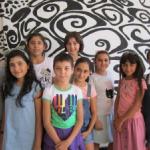We Speak More Than We Write
Primary tabs
As a rule, an important component of teaching the mother tongue is not highlighted in the learner's activities and is dropped out of the teacher's attention. My words refer to oral speech. Still, in the 19th century, Friedrich Adolph Diesterweg spoke about that. It was he who said that even though we use oral speech more than written one during our lifetime, teaching mother tongue and the whole instruction is mainly carried out in the direction of promoting the written language. I won't argue with this observation: I agree with the great German educator. And I won't have the answer to the question: what is the logic of doing so?
Numerous means, techniques and methods of developing writing skills have been formulated, defined and are used. What tools and methods of developing oral speech are there, and what speaking skills do they transfer. Which are the effective ways of developing oral speech? The development of oral speech shouldn`t always depend on the language teacher's efforts. The whole educational environment with all the educators should foster it. Teaching oral speech in the course of the mother tongue should even be more important than teaching writing.
Here, I will speak about my methods, my experience in promoting oral speech.
My approach is as follows: in order to speak an accurate language, the learner should get rid of his/her careless speech. In my opinion, speech carelessness characterizes the learner's oral speech most accurately. How can we overcome it? How can we make the learners themselves dislike their own careless, half-finished speech with lots of mistakes?
At first we create situations for natural communication and self-expression. Artificial dialogues, retelling stories
Artificial dialogues, retelling stories which becomes a sort of learning by-heart for hardworking students, have little effect on developing live speech (if it really has any effect). Then we record the learner’s speech with digital means, and after that we listen to it and discuss. Everybody is given such an opportunity with the access of digital means.
Below, there are two video materials. The sixth graders in two different classes were assigned to read the story “Bicycle” by Chabua Amirejibi, a Georgian writer. In one class, the discussion of the story was turned into a mock trial with their queries and perceptions, and in the other one, a round table discussion was organized. In both classes they try to express their opinions freely. I try not to interfere so as not to make the natural environment tense and to let them speak and express themselves freely. Listen to their speech:
You can also listen to the radio materials in the "Chatter Box". There are so many speech errors, wrong language structures! This is the current state of things of our oral speech.
Now I will tell you about the work we do after these video and radio materials have been created. At first, the learners listen to their and their friends' speeches with ear-phones. They write down, to their minds, the wrong language structures and mistakes. Then we begin the discussion answering the questions: "What should they have said?"
Finally, we draw the learner's attention to his/her oral speech without which the learner's speech can't be made more precise and the wording - more literate.
It is hard to say when the speech progress will be noticed. In whose speech and when will the positive changes be felt? The important thing is the way we go through providing natural communication which in itself is vigorous work with live language. We will see the results later. Where are we hurrying to?

